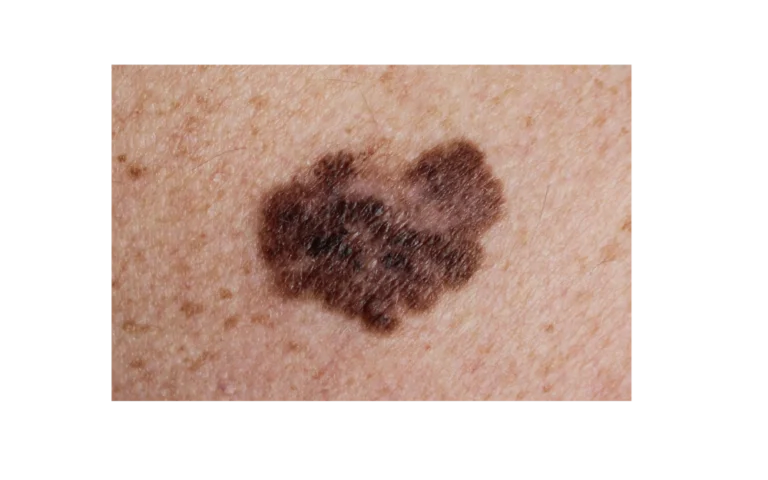Fortunately, melanoma is relatively uncommon. However, because patients struggle to secure timely appointments when seeking an evaluation of a new or changing mole the chance of a more serious stage at presentation increases. Say goodbye to the overwhelming frustration and anxiety caused by months-long waiting periods for appointments, as the Trillium Clinic proudly redefines the dermatologic care model, ensuring that every patient will be seen within 14 days of requesting an appointment. Step into a new era of patient-centered care, where the agony of waiting for appointments becomes a thing of the past.
What is Melanoma?

Melanoma typically appears as a new mole or a change in an existing mole. It is essential to monitor moles for the following warning signs using the ABCDE rule:
What is the ABCDE of Melanoma?
- Asymmetry: One half of the mole does not match the other half.
- Border irregularity: The edges of the mole are uneven, notched, or blurred.
- Color variation: The mole has different colors or shades within it, such as black, brown, tan, red, or blue.
- Diameter: The mole is larger than the size of a pencil eraser (about 6 millimeters).
- Evolving: The mole changes in size, shape, color, or elevation, or develops new symptoms such as itching, bleeding, or crusting.
What causes Melanoma?
The primary cause of melanoma is exposure to ultraviolet (UV) radiation from the sun or artificial sources like tanning beds. Other factors that increase the risk of developing melanoma include:
- Fair skin, light-colored eyes, and freckles: People with lighter skin tones are more susceptible to melanoma due to less natural protection against UV radiation.
- History of sunburns: Multiple severe sunburns, especially during childhood, can increase the risk.
- Family history: Having a close family member with melanoma increases the risk.
- Personal history: Individuals who have previously had melanoma are at higher risk of developing it again.
- Weakened immune system: People with compromised immune systems have an increased risk.
How is Melanoma Treated?
If melanoma is suspected, a healthcare professional, typically a dermatologist, will perform a biopsy to confirm the diagnosis. Treatment options depend on the stage and extent of the cancer
- Surgical excision: The primary treatment for localized melanoma involves surgically removing the cancerous tissue along with a margin of healthy skin.
- Lymph node evaluation: If melanoma has spread, nearby lymph nodes may need to be examined and potentially removed.
- Immunotherapy: This treatment uses medications to stimulate the immune system to fight against cancer cells.
- Targeted therapy: Certain medications target specific genetic mutations present in melanoma cells to inhibit their growth.
- Chemotherapy: In advanced cases, chemotherapy drugs may be used to kill cancer cells or slow their growth.
- Radiation therapy: High-energy beams are directed at cancer cells to destroy them or shrink tumors.
Can Melanoma be prevented?
You can reduce the risk of developing melanoma by taking precautions such as:
- Limiting sun exposure: Seek shade, especially during peak sun hours, and wear protective clothing, hats, and sunglasses.
- Using sunscreen: Apply broad-spectrum sunscreen, with a high SPF, and a significant percentage of physical blockers (Zinc Oxide, Titanium Dioxide) regularly, even on cloudy days.
- Avoiding tanning beds: Tanning beds emit harmful UV radiation and increase the risk of skin cancer.
- Regular self-exams: Check your skin regularly, including moles and freckles, and report any changes or concerning symptoms to a healthcare professional.
Embark on your journey
Early detection is crucial for successful treatment of melanoma. You should schedule annual skin checks if you are low risk, and more frequent total body skin examinations if you have 1 or more of the above risk factors. As experts in the detection and treatment of skin cancer, including melanoma, we invite patients from Chapel Hill, Carrboro, Hillsborough, Pittsboro, Mebane, Durham, Burlington, Cary, Raleigh, Holly Springs and surrounding cities, to schedule their total body skin examination with us today. You can self-schedule here or contact us by phone and we will help you find a convenient appointment. Once you arrive, a member of our dermatology team will conduct a comprehensive evaluation of your skin and discuss any findings that may be concerning. Melanoma can be treated effectively when identified early. Do not put off your annual skin exam any longer!

